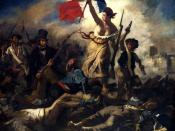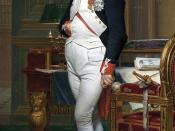Aïsha Atherly November 2006
European History
How far did Napoleon Bonaparte maintain the revolutionary ideals of liberty and equality in France?
Prior to the French Revolution, the system of government was based on Absolute Monarchy which meant that the monarch claimed total authority of the state. They were answerable to no one and their word was law. At that time, the social structure in France was in need of desperate reform. It was divided into three estates; the clergy, nobles and peasants. Each estate, especially the nobles and clergy, had its particular rights and privileges. There was no equality of taxation; the peasants were forced to pay the highest amounts while and the nobles were totally exempted. They were burdened with dues which limited their ability to survive from year to year. According to Derrick Murphy et al, because France was highly dependent on agriculture, feudalism was a necessity. Peasants were obligated to perform a number of tasks such as working for the landowner free of charge during harvesting or giving the landowner a proportion of their produce.
Within each estate there was inequality. Within the clergy, the Archbishops and bishops lived like nobles whereas the priests lived like peasants. The nobility of the sword, who had inherited their titles, disregarded the nobility of the robe who gained their status either by marriages or by other means. In turn, the nobility of the sword disregarded the Annoblis who had purchased their titles. Within the third estate, the bourgeoisie was considered to be superior to the urban workers and peasants. Accordingly, it is evident that the social structure in France disregarded the ideals of liberty and equality. Also, there was little or no provision of education by the monarchy, especially for the peasants. In terms of religion, faiths other than Catholicism...


